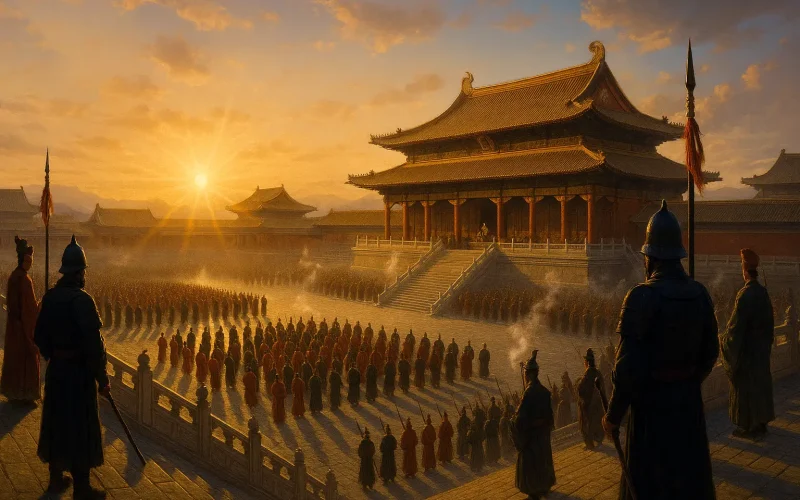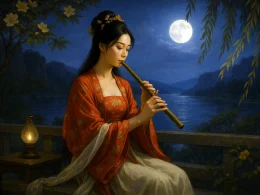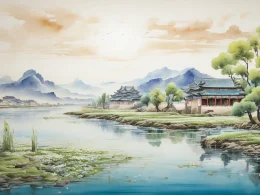The red-capped Cock-Man has just announced morning;
The Keeper of the Robes brings Jade-Cloud Furs;
Heaven's nine doors reveal the palace and its courtyards;
And the coats of many countries bow to the Pearl Crown.
Sunshine has entered the giants' carven palms;
Incense wreathes the Dragon Robe:
The audience adjourns-and the five-coloured edict
Sets girdle-beads clinking toward the Lake of the Phoenix.
Original Poem
「和贾至舍人早朝大明宫之作」
王维
绛帻鸡人送晓筹, 尚衣方进翠云裘。
九天阊阖开宫殿, 万国衣冠拜冕旒。
日色才临仙掌动, 香烟欲傍衮龙浮。
朝罢须裁五色诏, 佩声归向凤池头。
Interpretation
Composed in late spring 738 AD during Emperor Xuanzong's Qianyuan era, this poem was written when Wang Wei served as Zhongshu Sheren (Secretarial Court Official) at the height of his political and literary career. Inspired by Jia Zhi's original poem "Early Court at Daming Palace Presented to Colleagues from Two Departments," Wang created this masterful response - though not following the original rhyme scheme, it perfectly captures the solemn grandeur of the imperial morning audience through three clear phases: pre-court preparations, the audience itself, and post-court activities.
First Couplet: "绛帻鸡人送晓筹,尚衣方进翠云裘。"
Jiàng zé jī rén sòng xiǎo chóu, shàng yī fāng jìn cuì yún qiú.
"Crimson-capped cock-callers announce dawn's measure; / Robe-keepers present emerald-cloud dragon robes with pleasure."
This depicts pre-dawn palace preparations. The "crimson caps" and "emerald-cloud" robes create vivid color contrasts highlighting imperial decorum. "Dawn's measure" and "present with pleasure" precisely convey the court's meticulous morning rhythms.
Second Couplet: "九天阊阖开宫殿,万国衣冠拜冕旒。"
Jiǔ tiān chāng hé kāi gōng diàn, wàn guó yī guān bài miǎn liú.
"Heaven's ninefold gates swing palace doors wide; / Ten thousand officials bow to crown and tide."
The formal audience commences. "Heaven's ninefold gates" symbolize the palace's divine majesty, while "ten thousand officials" (hyperbole for all courtiers) prostrate before imperial authority, showcasing Tang ceremonial splendor.
Third Couplet: "日色才临仙掌动,香烟欲傍衮龙浮。"
Rì sè cái lín xiān zhǎng dòng, xiāng yān yù bàng gǔn lóng fú.
"Sunlight first touches immortal-palm screens; / Incense smoke caresses floating dragon seams."
Capturing subtle audience moments, the adverbs "first" and "almost" animate the scene. Sunlit ceremonial fans and smoke-wreathed dragon robes merge sacred grandeur with dynamic vitality, the verb "caress" making embroidered dragons seem alive.
Fourth Couplet: "朝罢须裁五色诏,佩声归向凤池头。"
Cháo bà xū cái wǔ sè zhào, pèi shēng guī xiàng fèng chí tóu.
"Court adjourned, five-colored edicts await; / Jade pendants chime toward Phoenix Pool's gate."
The conclusion shifts to Jia Zhi's duties. "Five-colored edicts" represent literary work while "jade pendants" aurally mark officials returning to the Secretariat, brilliantly echoing Jia's original without naming him directly.
Holistic Appreciation
The poem's tripartite structure unfolds with symphonic precision: dawn preparations establish solemnity, the audience builds majestic momentum, and the return to official duties provides graceful closure. Wang Wei masterfully balances monumental scenes ("heaven's gates") with exquisite details ("floating dragon seams"), blending sacred grandeur with human-scale activities. The seamless integration of visual splendor and auditory elegance (chiming pendants) demonstrates his dual mastery as poet-painter.
Artistic Merits
Wang Wei's poetic response not only preserves the central theme of Jia Zhi's original work, but elevates it through more refined imagery and linguistic artistry. The poem employs rich sensory impressions—the "crimson caps" of court heralds, "emerald-cloud" dragon robes, and chiming jade pendants—creating exceptional pictorial vividness and musicality. Simultaneously, it masterfully blends tangible and ethereal elements, with phrases like "heaven's ninefold gates," "immortal-palm screens," and "incense smoke" evoking the palace's sacred mystique. The exquisite diction and impeccable structure demonstrate Wang's dual cultivation as poet-painter, while showcasing his unparalleled command of courtly subject matter.
Insights
Beyond documenting Tang court rituals, the poem reveals how artistic sensibility can transform formal political spaces into aesthetic experiences. Wang's ability to imbue ceremonial rigidity with poetic fluidity suggests that even the most institutionalized power structures contain latent beauty awaiting artistic revelation. This interplay between protocol and creativity remains profoundly instructive for modern intersections of art and governance.
Poem translator
Kiang Kanghu
About the poet

Wang Wei (王维), 701 - 761 A.D., was a native of Yuncheng, Shanxi Province. Wang Wei was a poet of landscape and idylls. His poems of landscape and idylls, with far-reaching images and mysterious meanings, were widely loved by readers in later generations, but Wang Wei never really became a man of landscape and idylls.












